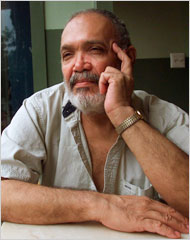
NOVEMBER 15 TRIBUTE: A non-stop, ongoing reading of Ed Vega’s “The Lamentable Journey of Omaha Bigelow into the Impenetrable Loisaida Jungle” — Magical Realism comes to Loisaida (and now El Barrio)! Bring your copy!
*****
September 9, 2008
Edgardo Vega Yunqué, Novelist of the Puerto Rican Experience in New York, Dies at 72
By BRUCE WEBER
Edgardo Vega Yunqué, whose novels and stories about life on the Lower East Side of Manhattan were picaresque, combustive and sometimes flamboyantly comic expressions of the Puerto Rican experience in New York’s multicultural maelstrom, died on Aug. 26 in Brooklyn. He was 72 and lived in the Sunset Park neighborhood of Brooklyn.
The cause was probably a blood clot, said his daughter, Alyson Vega, who said that he died suddenly during a visit to the emergency room at Lutheran Medical Center and that his family had not been immediately notified.
Mr. Vega Yunqué, who moved to New York from Puerto Rico at the age of 13 and spent his teenage years in a Puerto Rican and Irish neighborhood in the Bronx, resisted characterization both as a writer and as an individual. Angered by the expectation of Latin writers either to document ghetto life or to “dabble in magic realism,” as he put it, he was known as a contentious man with a philosophy founded on the sanctity of self-expression, and he wrote with a voice that was lyrical, insistent, irrepressible and often scathingly satiric.
In “The Lamentable Journey of Omaha Bigelow Into the Impenetrable Loisada Jungle,” (Overlook Press, 2004), he cast a comic, sardonic eye on the American response to the Sept. 11 attacks. His latest book, “Rachel Horowitz, Puerto Rican Sex Freak,” an earthy send-up of sexual politics, was scheduled for publication this summer but Overlook canceled it after a dispute with him.
“He was an iconoclast of the first order,” said his agent, Tom Colchie. “Ed was always cantankerous about editing. He would say, ‘I’m not going to be any publisher’s fuzzy-wuzzy.’ ”
With a counterculture-ish perspective and a penchant for florid turns of phrase and hyper-punctuated sentences, he had a literary relative in Tom Robbins, though his work often had a political fierceness about it as well.
His best-known book, “No Matter How Much You Promise to Cook or Pay the Rent You Blew It Cauze Bill Bailey Ain’t Never Coming Home Again” (Farrar, Straus and Giroux, 2003), is a sprawling tale of two families, one Puerto Rican and one Irish, and their intertwining over several generations. The Vietnam War plays a central role and so does American jazz, not only thematically — one main character is a pianist who walks away from the chance to play with Miles Davis when he joins the Marines — but stylistically as well, with narrative strains wandering improvisatorily away from the main tale and finding intricate paths that bring them back again. Julia Livshin, writing in The New York Times Book Review, said it was a “powerhouse of a novel” that “brings vividly to life, with its polyphony of voices, the simmering ethnic stew of the great American city.”
Edgardo Alberto Vega Yunqué was born in Ponce, Puerto Rico, on May 20, 1936, but he was raised in the town of Cidra. His father, a Baptist minister, moved the family to New York in 1949 when he took over a Spanish-speaking congregation in the South Bronx. Mr. Vega Yunqué was a radio operator in the Air Force, and during one home leave, he was asked by his sister to help clean out an estate in central New York. In the attic he found hundreds of paperback novels — by Steinbeck, Faulkner, Hemingway and others — and he began reading them voraciously. That spurred him to write novels.
Mr. Vega Yunqué attended New York University and worked as a community organizer before publishing his first novel, “The Comeback,” in 1985. His other works include two collections of stories and the novel “Blood Fugues.” (HarperCollins, 2006.) In 1994, he founded the Clemente Soto Vélez Cultural Center on the Lower East Side as a home for theater artists, dancers and visual artists, and he ran it until 2000, when he stepped down, his tenure marred by fierce disputes between the mostly Hispanic theater artists and the mostly white visual artists over the center’s management.
Mr. Vega’s marriage to Pat Vega ended in divorce, the culmination of what his daughter, Alyson, and his stepdaughter, the singer Suzanne Vega, described as a tempestuous home life. Her stepfather was passionate about knowledge and passed that zeal on, Suzanne Vega said. “But the thing that made him a great writer was the thing that also made him dangerous,” she added. “Any boundary or restriction he took as a red flag.”
In addition to Suzanne and Alyson Vega, both of Manhattan, Mr. Vega Yunqué is survived by a son, Matthew, of Amagansett, New York; a brother, Jay Vega, of Cape May, N.J.; a sister, Abigail McGlynn, of Queens; and a granddaughter.
